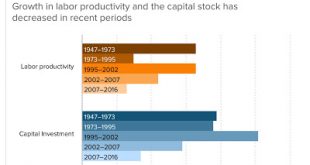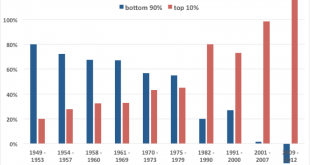By Lance TaylorPresident Trump, in his inaugural address and elsewhere, rightly says that over the decades since 1980 American household distributions of income and wealth became strikingly unequal. But if recent budget and legislative proposals from Trump and the House of Representatives come into effect, today’s distributional mess would become visibly worse.First, I will sketch how the mess happened, then I will propose some ideas about how it might be cleaned up. I will show that...
Read More »The Wage Structure, Rents and Urban Inequality in Canada
Richard Florida’s new book, The New Urban Crisis (Basic Books, 2017) takes a careful look at rising inequality in big cities in the United States. He details the fact that many of the winners of today’s economy, the top 1% and top 10%, are located in a small number of “superstar” cities such as New York, Los Angeles, the Bay area, Washington and Boston where well paid jobs in higher education, finance, tech, higher education and entertainment are highly concentrated. These cities are...
Read More »Fiscal situation of Canada’s ‘oil rich’ provinces
I’ve just written a blog post about the fiscal situation of Canada’s ‘oil rich’ provinces (i.e., Alberta, Saskatchewan and Newfoundland and Labrador). It consists of a summary of key points raised at a PEF-sponsored panel at this year’s Annual Conference of the Canadian Economics Association. Points raised in the blog post include the following: -The price of oil is impossible to accurately predict, and there’s no guarantee it will rise to past levels. -Each of Canada’s ‘oil rich’ provinces...
Read More »Income Inequality Surged Under Harper
Just as Conservatives gathered to elect a new leader, Statistics Canada released income data for 2015. These allow us to look at trends under the full term of the Harper Government from 2006 to 2015. Average after tax income of economic families rose over this period – from $68,200 to $76,900 in inflation-adjusted dollars. But the gains were very unfairly distributed. The after tax income share of the top 10% of families and persons rose from 27.2% to 27.7% and that of the next 10% rose from...
Read More »Technological progress is NOT the cause of unemployment and inequality
Or that is what the recent Economic Policy Institute (EPI) Report by Lawrence Mishel and Josh Bivens says. Their study is essentially a critique of a recent study by Acemoglu and a co-author that suggests that robotization would have a large effect on employment generation. Note that this is not a requirement in mainstream neoclassical (marginalist) theory. Actually, technological progress should generate higher real wages and higher employment in the conventional model of the labor market...
Read More »Advocacy in Canada’s Affordable Housing and Homelessness Sectors
I’ve just written a blog post on advocacy in Canada’s affordable housing and homelessness sectors. In the post, I define advocacy as “a collective effort to bring about changes to political priorities, funding levels, legislation, regulations or policies.” I also discuss seven approaches to advocacy in Canada’s affordable housing and homelessness sectors. The full blog post can be found at this link. Enjoy and share:
Read More »A Response to the 2017 Saskatchewan Budget
I have an opinion piece on Saskatchewan’s recent budget in the Regina Leader-Post. Points raised in the opinion piece include the following: -Reductions in personal and corporate income taxes help the rich more than the poor (and this budget cut both personal and corporate income taxes). -Increases in sales tax hurt the poor more than the rich (and this budget increased both the breadth and the rate of the provincial sales tax). -A one-dollar increase in government spending on public...
Read More »Ontario’s Electricity Sector II: Political Economy Update
This is a third guest post by Edgardo Sepulveda, who is a Toronto-based expert in telecommunications and regulatory economics. Twitter: @E_R_Sepulveda By Edgardo Sepulveda In my previous post of January 29 I described how decisions by different Ontario governments gave rise to excess electricity generation with an inflated cost structure, leading to higher electricity prices and increased inequality. Since then, the Ontario Minister of Energy delivered a “mea culpa” speech on February 24...
Read More »Inequality Update: Who Gains When Income Grows?
By Pavlina R. TchernevaBard College Growth in the US increasingly brings income inequality. A striking deterioration in this trend has occurred since the 80s, when economic recoveries delivered the vast majority of income growth to the wealthiest US households. This note updates my original inequality chart (reproduced below) with the latest data. For earlier discussions, see e.g., here, here, and here. Figure 1: bottom 90% vs. top 10%, 1949-2012 expansions (incl. capital gains) The...
Read More »The Alternative Federal Budget 2017
Your access to this site has been limited Your access to this service has been temporarily limited. Please try again in a few minutes. (HTTP response code 503) Reason: Exceeded the maximum number of page requests per minute for humans. Important note for site admins: If you are the administrator of this website note that your access has been limited because you broke one of the Wordfence blocking rules. The reason your access was limited is: "Exceeded the maximum number of page requests per...
Read More » Heterodox
Heterodox




